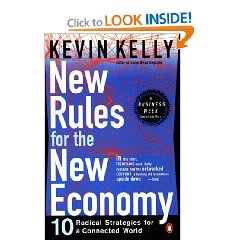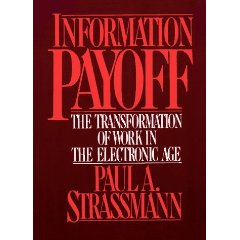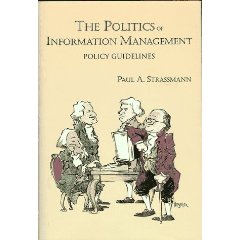Update of 31 May 08 to add links:
THE HACKER CRACKDOWN: LAW AND DISORDER ON THE ELECTRONIC FRONTIER
Hackers: Heroes of the Computer Revolution
Information Payoff: The Transformation of Work in the Electronic Age
Collective Intelligence: Mankind's Emerging World in Cyberspace (Helix Books)
The Unfinished Revolution: Human-Centered Computers and What They Can Do For Us
The Wealth of Networks: How Social Production Transforms Markets and Freedom
Collective Intelligence: Creating a Prosperous World at Peace
Review: New Rules for the New Economy
5 Star, Best Practices in Management, Capitalism (Good & Bad), Complexity & Resilience, Culture, Research, Economics, Information SocietyReview: Blown to Bits–How the New Economics of Information Transforms Strategy
5 Star, Best Practices in Management, Capitalism (Good & Bad), Change & Innovation, Economics, Information SocietyReview: Silicon Snake Oil–Second Thoughts on the Information Highway
5 Star, Capitalism (Good & Bad), Change & Innovation, Information Society, Information Technology, Misinformation & PropagandaReview: Consilience–the Unity of Knowledge
5 Star, Change & Innovation, Civil Society, Complexity & Resilience, Consciousness & Social IQ, Decision-Making & Decision-Support, Education (General), Environment (Solutions), Information Operations, Nature, Diet, Memetics, Design, Science & Politics of Science, Values, Ethics, Sustainable Evolution, Voices Lost (Indigenous, Gender, Poor, Marginalized)
Comment: This is still one of the best books for someone who wants to think deeply about knowledge. Below are links to some others I recommend.
Our answer to Levy, but an order of magnitude more practical and steeped in some of the best endnotes I've ever enjoyed. Consilience is the “jumping together” of knowledge across boundaries, and the greatest enterprise of the mind. He begins with an example, showing how biology, ethics, social science, and environmental policy must all come together to properly resolve a global environmental issue, but actually do not-the learned individuals are fragmented into four separate communities, and within those communities further fragmented into nationalities and cliques and jobs, and it is our greater loss for we cannot arrive at the best policy without being able to integrate the knowledge across all these boundaries. He emphasizes that the public must be educated and have access to this unified knowledge, not just the policymakers. He poses, and then answers across the book, this question: “What is the relation between science and the humanities, and how is it important to human welfare?” In my own mind, Edward O. Wilson has defined both national and global intelligence writ large, and done so in way that suggests the “virtual intelligence community” is a very practical and achievable vision.
The Future of Life
The Wealth of Networks: How Social Production Transforms Markets and Freedom
The Wealth of Knowledge: Intellectual Capital and the Twenty-first Century Organization
Revolutionary Wealth: How it will be created and how it will change our lives
Powershift: Knowledge, Wealth, and Power at the Edge of the 21st Century
Infinite Wealth: A New World of Collaboration and Abundance in the Knowledge Era
The Age of Missing Information
Forbidden Knowledge: From Prometheus to Pornography
Smart Mobs: The Next Social Revolution
Information Productivity: Assessing Information Management Costs of U. S. Corporations
Review: Information Payoff–The Transformation of Work in the Electronic Age
5 Star, Best Practices in Management, Change & Innovation, Complexity & Resilience, Information Operations, Information Society, Information TechnologyReview: The Politics of Information Management–Policy Guidelines
5 Star, Capitalism (Good & Bad), Complexity & Catastrophe, Culture, Research, Executive (Partisan Failure, Reform), Information Operations, Information Society, Information TechnologyMany of the cartoons published in the Irreverent Dictionary came from this book, and I was among those who suggested to Paul that he should publish the cartoons separately. They were, however, essential to this otherwise intimidating book that is nothing less than an operating manual for the Captain of the Virtual Network. The bottom line that I took from this book is that Kevin Kelly is right, our national and international information systems are “out of control” and our policy leaders have abdicated their responsibilities to technicians who do not have the political, economic, or common sense of two ducks and a chicken. As Paul alludes in one of his footnotes, the Network today is somewhat in relationship to the “horseless carriage” stage of the automobile, and we have a very long way to go before policy helps make computers as user-friendly and reliable and interoperable as the telephone and the automobile are today.









